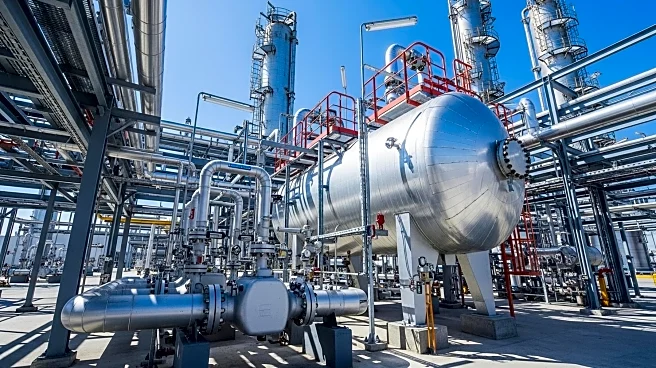What is the story about?
What's Happening?
Nigeria is aiming to increase its gas production to 10 billion standard cubic feet per day by 2030. Finance Minister Wale Edun held discussions with Nigeria LNG Limited (NLNG) to strategize on achieving this target. The meeting focused on production goals, investment climate, and ongoing reforms in the gas industry. Edun emphasized the importance of creating a competitive and investor-friendly environment, citing recent agreements like the Deepwater deal with TotalEnergies. He assured stakeholders of reforms to streamline oversight and eliminate inefficiencies. NLNG CEO Philip Mshelbila reported improvements in gas supply and security, as well as infrastructure advancements.
Why It's Important?
Nigeria's ambitious gas production target is crucial for its energy sector and economic growth. Achieving this goal would enhance Nigeria's position in the global energy market and attract foreign investment. The focus on infrastructure and security improvements is vital for ensuring reliable gas supply and boosting capacity utilization. The government's commitment to reforms and digital trade systems aims to create a transparent and technology-driven environment for investors. This initiative aligns with President Bola Ahmed Tinubu's Renewed Hope Agenda, which seeks to drive economic growth and development in Nigeria.
What's Next?
Nigeria will continue to implement reforms and infrastructure projects to support its gas production goals. The government is expected to engage with international partners and investors to secure funding and expertise for these initiatives. The focus on digital trade systems and tax reforms will be crucial in creating an attractive business landscape. As Nigeria progresses towards its 2030 target, stakeholders will monitor developments and assess the impact on the country's energy sector and economy.
Beyond the Headlines
The expansion of Nigeria's gas industry has broader implications for regional energy security and economic development. It highlights the potential for African countries to leverage their natural resources for growth and stability. The focus on technology-driven reforms reflects a global trend towards digitalization and efficiency in the energy sector. Nigeria's efforts may serve as a model for other countries seeking to enhance their energy capabilities and attract investment.















